新概念英语1短语句子整理L81-90
[全]新概念英语第一册短语归纳81-120课详解
![[全]新概念英语第一册短语归纳81-120课详解](https://img.taocdn.com/s3/m/d347baa1f5335a8103d2202a.png)
新概念英语第一册短语归纳81-120课详解Lesson 81~ 82have a bath = take a bath 洗澡have a swim = take a swim 游泳have a haircut = have one’s haircut 理发have a lesson 上课have a party = hold a party 举行晚会have a holiday = go for a holiday 度假= take a holiday = spend one’s holiday= make holidayhave a good time = enjoy oneself 玩得好have a shave = shave 刮胡子have a cigarette 抽烟have a glass of whisky 喝一杯威士忌have a look = take a look 看一看have tea = drink tea 喝茶have a meal = eat a meal 吃一餐have breakfast (lunch、dinner、supper)= eat one’s breakfast ( …… ) 吃早饭(午饭、晚饭、晚饭) Lesson 83~ 84a cup of 一杯go into … 到……里面去go home = get home 回家= come back home = go back homeleave a place for a place 离开某地前往某地Excuse the mess. 乱七八糟, 请原谅Lesson 85~ 86have been to … 到过……What’s on? 上演什么电影?on TV 在电视上all the time 一直; 始终just like 就像Lesson 87~ 88the number of your car 你的车牌号work on 从事做某件事情bring sb. sth. 带来某物给某人= bring sth. to sb.take sb. sth. = take sth. to sb. 带给某人某物have a crash 出车祸That’s right. = That’s true. 是的; 正确的。
新概念一册第 81-90课知识点总结

Lesson 81 Roast beef and potatoes [词汇](6)bath n. 洗澡nearly adv. 几乎,将近ready adj. 准备好的,完好的dinner n. 正餐,晚餐restaurant n. 饭馆,餐馆roast adj. 烤的★bath n. 洗澡have(take) a bath 洗澡★nearly adv. 几乎,将近① v. 几乎;差不多;差点儿I nearly missed the train.② v. 极;密切地He resembles a film star nearly.The matter concerns us nearly. 这事与我们有切身关系。
★ready adj. 准备好的,完好的① adj. 准备就绪的Dinner will be ready in 20 minutes.Are you ready to leave?② adj. 预先准备好的;立即可得到的The apples are ripe and ready to eat.We must get the house ready for our guests.我们必须把房子收拾停当,以期我们的客人随时入住。
③ adj. 快的,立即的He gave a ready consent. 他立即爽快地表示同意。
This new system gives users readier access to the data.这个新系统可以使用户们更快捷地进入数据库。
★dinner n. 正餐,晚餐three meals a day 一日三餐breakfast 早饭lunch 午餐tea 下午茶supper 晚饭dinner 正餐meal 一顿饭[课文]SAM: Hi, Carol! Where's Tom?CAROL: He's upstairs.He's having a bath.CAROL: Tom!TOM: Yes?CAROL: Sam's here.TOM: I'm nearly ready.Hello, Sam. Have a cigarette.SAM: No, thanks, Tom.TOM: Have a glass of whisky then.SAM: OK. Thanks.TOM: Is dinner ready, Carol?CAROL: It's nearly ready.We can have dinner at seven o'clock.TOM: Sam and I had lunch together today.We went to a restaurant.CAROL: What did you have?TOM: We had roast beef and potatoes.CAROL: Oh!TOM: What's the matter, Carol?CAROL: Well, you're going to have roast beef and potatoes again tonight!Lesson 82 I had …[词汇](5)breakfast n. 早饭haircut n. 理发party n. 聚会holiday n. 假日Lesson 83 Going on holiday[词汇](5)mess n. 杂乱,凌乱pack v. 包装,打包,装箱suitcase n. 手提箱leave v. 离开already adv. 已经★mess n. 杂乱,凌乱Excuse the mess. 乱七八糟,请原谅。
新概念英语第一册惯用语整理
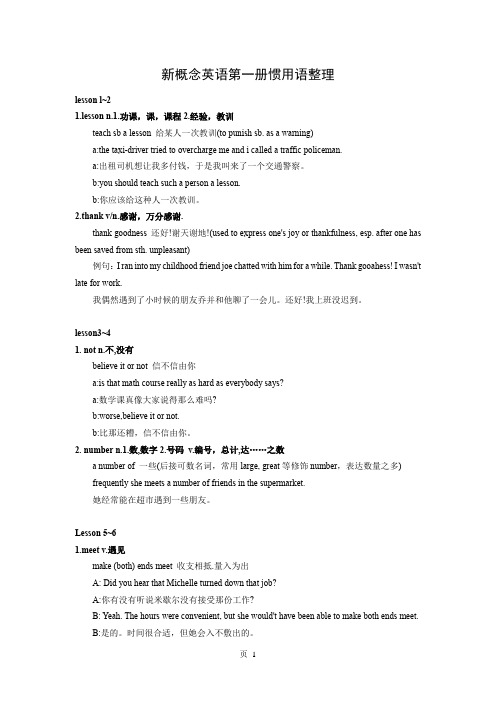
新概念英语第一册惯用语整理lesson l~21.lesson n.1.功课,课,课程2.经验,教训teach sb a lesson 给某人一次教训(to punish sb. as a warning)a:the taxi-driver tried to overcharge me and i called a traffic policeman.a:出租司机想让我多付钱,于是我叫来了一个交通警察。
b:you should teach such a person a lesson.b:你应该给这种人一次教训。
2.thank v/n.感谢,万分感谢.thank goodness 还好!谢天谢地!(used to express one's joy or thankfulness, esp. after one has been saved from sth. unpleasant)例句:I ran into my childhood friend joe chatted with him for a while. Thank gooahess! I wasn't late for work.我偶然遇到了小时候的朋友乔并和他聊了一会儿。
还好!我上班没迟到。
lesson3~41. not n.不,没有believe it or not 信不信由你a:is that math course really as hard as everybody says?a:数学课真像大家说得那么难吗?b:worse,believe it or not.b:比那还糟,信不信由你。
2. number n.1.数,数字2.号码v.编号,总计,达……之数a number of 一些(后接可数名词,常用large,great等修饰number,表达数量之多)frequently she meets a number of friends in the supermarket.她经常能在超市遇到一些朋友。
新概念1 Lesson81-93课知识点

新概念第一册 81&82 课知识点一.短语1.have a bath洗澡 5.have breakfast 吃早饭2.have a cigarette抽烟 6.have dinner吃晚饭3.have a glass of whisky喝杯威士忌7.roast beef烤牛肉4.have lunch吃午饭8.go to restaurant去了一家饭店二.重点词汇1.nearly adv. 几乎,将近① v.几乎;差不多;差点儿I nearly missed the train.② v.极;密切地He resembles a film star nearly.The matter concerns us nearly. 这事与我们有切身关系。
2.ready adj. 准备好的,完好的① adj.准备就绪的Dinner will be ready in 20 minutes.Are you ready to leave?② adj.预先准备好的;立即可得到的The apples are ripe and ready to eat.We must get the house ready for our guests.我们必须把房子收拾停当,以期我们的客人随时入住。
3.dinner n. 正餐,晚餐three meals a day一日三餐breakfast早饭lunch午餐tea下午茶supper晚饭dinner正餐meal一顿饭二.语法点1. I had...我吃(喝,从事)了...had 是 have 的过去式。
1例句:We had a holiday last month.我们上个月度假的。
You had a good time yesterday.你昨天玩的开心。
I had a meal at a restaurant last month. 我上个月在参观吃饭的。
新概念第一册 83&84 课知识点一.短语e in 进来 4.pack our suitcases 收拾行李箱2.have a cup of coffee 喝杯咖啡 5.have a holiday 度假3.go into the living room 到客厅里 6.stay at home 待在家里二.重点词汇1.pack v. 包装,打包,装箱① v.打包,装箱pack one’s suitcases 收拾行李。
全]新概念英语第一册全册短语归纳大全
![全]新概念英语第一册全册短语归纳大全](https://img.taocdn.com/s3/m/28806c1a0166f5335a8102d276a20029bd6463dc.png)
全]新概念英语第一册全册短语归纳大全New Concept English Unit 1-2: Common Phrases1.Excuse me - Sorry。
can I interrupt?2.I beg your pardon - Could you please repeat that?3.Thank you - Thanks.4.Thank you very much - Many thanks。
thanks a lot。
thanks very much.5.You're e - No need to thank me。
it's okay。
not at all。
it was nothing.6.It's a pleasure - I'm happy to help。
my pleasure.7.I'm sorry - Apologies.8.Good morning - Hello in the morning.9.This is + name - Let me XXX.10.Nice to meet you - Pleased to meet you。
glad to meet you.11.How do you do。
- Hello。
how are you?12.What make。
- What brand?13.A new student - A new student.14.XXX。
- What is your nality?15.What's your job。
- What do you do for a living?16.A keyboard operator - A computer operator.17.An engineer - XXX.18.How are you。
- How are you doing?19.I'm fine - I'm good。
新概念第一册短语总结

新概念第一册短语总结《新概念英语》第一册是一本经典的英语教材,对于初学者来说是非常有帮助的。
这本教材中有很多常见的短语,通过掌握这些短语可以提高英语水平。
下面我来总结一下《新概念英语》第一册中的常见短语。
1. Break up 分手Break up 意思是分裂、分解,这里引申为分手。
例句:Tom and Lisa broke up after dating for three years.(汤姆和丽莎交往三年后分手了。
)2. Look over 检查、审查Look over 意思是检查,审查。
例句:The teacher looked over the students' homework.(老师检查了学生们的家庭作业。
)3. Cut down 减少Cut down 意思是减少,降低。
例句:You should cut down on your sugar intake.(你应该减少摄入的糖分。
)4. Carry on 继续Carry on 意思是继续进行。
例句:They decided to carry on with their plan despite the bad weather.(尽管天气不好,他们决定继续进行计划。
)5. Give up 放弃Give up 意思是放弃。
例句:Don't give up your dreams.(不要放弃你的梦想。
)6. Look forward to 期待Look forward to 意思是期待。
例句:She is looking forward to her vacation.(她期待着她的假期。
)7. Get on 上车、认识、相处Get on 可以表示上车,也可以表示认识、相处。
例句:Please get on the bus.(请上车。
)I don't get on well with my neighbor.(我和邻居相处不好。
新概念英语第一册Lesson81~86生词和短语

【导语】新概念英语之所以经久不衰是因为以其全新的教学理念,有趣的课⽂内容和全⾯的技能训练,为英语学习者排忧解难,深受⼴⼤英语学习者的欢迎和喜爱。
想要学好英语的你,怎能错过?快来加⼊学习吧!⽆忧考为您提供了以下内容,希望能够为⼤家学习新概念英语提供帮助!新概念英语第⼀册Lesson81⽣词和短语 bath /ba:θ/ n.洗澡 nearly /'niəli/ adv. ⼏乎,将近 ready /'redi/ adj. 准备好的,完好的 dinner /'dinə/ n. 正餐,晚餐 restaurant /'restərɔnt/ n. 饭馆,餐馆 roast /rəust/adj. 烤的新概念英语第⼀册Lesson82⽣词和短语 breakfast/'brekfəst/ n. 早饭 haircut/'heəkʌt/ n. 理发 party/'pa:ti/ n. 聚会 holiday/'hɔlidi/ n. 假⽇新概念英语第⼀册Lesson83⽣词和短语 mess /mes/ n. 杂乱,凌乱 pack /pæk/ v. 包装,打包,装箱 suitcase /'su:tkeis/ n. ⼿提箱 leave /li:v/ (left /left/, left) v. 离开 already /ɔ:l'redi/ adv. 已经新概念英语第⼀册Lesson84⽣词和短语 Paris / 'pæris/ n. 巴黎 cinema / 'sinimə/ n. 电* film /film/ n. 电影 beautiful /'biu:tifəl/ adj. 漂亮的 city /'siti/ n. 城市 never /'nevə/ adv. 从来没有 ever /'evə/ adv. 在任何时候新概念英语第⼀册Lesson85⽣词和短语 attendant /ə'tendənt/ n. 接待员 bring /briŋ/ (brought /brɔ:t/, brought) v. 带来,送来 garage /'gæra:ʒ/ n.车库,汽车修理⼚ crash /kræʃ/ n. 碰撞 lamp-post /'læmp-pəust/ 灯杆 repair / ri'peə/ v. 修理 try /trai / v. 努⼒,设法新概念英语第⼀册Lesson86⽣词和短语 believe /bi'li:v/ v. 相信,认为 may /mei/ modal verb(⽤于请求许可)可以 how long多长 since /sins / prep. ⾃从 why /wai/ adv. 为什么 sell /sel/ (sold/ səuld/, sold) v. 卖,出售 because /bi'kɔz/ conj. 因为 retire /ri'taiə/v. 退休 cost /kɔst/ (cost, cost) v. 花费 pound /paund/ n. 英镑(£) worth /wə:θ/ prep. 值……钱 penny/'peni/ n. 便⼠。
新概念英语第一册课文语法详解81-92
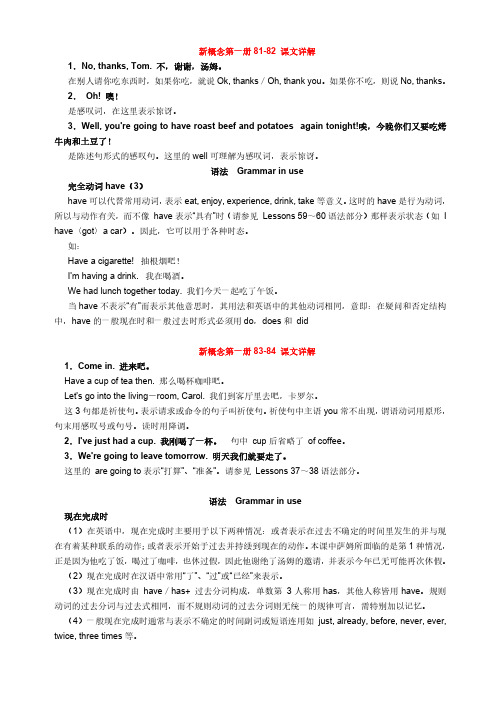
1.No, thanks, Tom. 不,谢谢,汤姆。
在别人请你吃东西时,如果你吃,就说Ok, thanks/Oh, thank you。
如果你不吃,则说No, thanks。
2.Oh! 噢!是感叹词,在这里表示惊讶。
3.Well, you're going to have roast beef and potatoes again tonight!唉,今晚你们又要吃烤牛肉和土豆了!是陈述句形式的感叹句。
这里的well可理解为感叹词,表示惊讶。
语法Grammar in use完全动词have(3)have可以代替常用动词,表示eat, enjoy, experience, drink, take等意义。
这时的have是行为动词,所以与动作有关,而不像have表示“具有”时(请参见Lessons 59~60语法部分)那样表示状态(如I have〈got〉a car)。
因此,它可以用于各种时态。
如:Have a cigarette! 抽根烟吧!I'm having a drink. 我在喝酒。
We had lunch together today. 我们今天一起吃了午饭。
当have不表示“有”而表示其他意思时,其用法和英语中的其他动词相同,意即:在疑问和否定结构中,have的一般现在时和一般过去时形式必须用do,does和did新概念第一册83-84 课文详解1.Come in. 进来吧。
Have a cup of tea then. 那么喝杯咖啡吧。
Let's go into the living-room, Carol. 我们到客厅里去吧,卡罗尔。
这3句都是祈使句。
表示请求或命令的句子叫祈使句。
祈使句中主语you常不出现,谓语动词用原形,句末用感叹号或句号。
读时用降调。
2.I've just had a cup. 我刚喝了一杯。
句中cup后省略了of coffee。
新概念英语第一册 知识总结
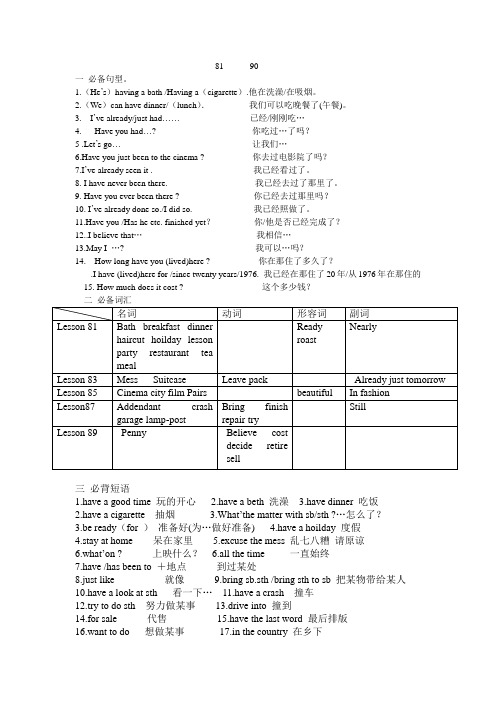
81---------90一必备句型。
1.(He’s)having a bath /Having a(cigarette).他在洗澡/在吸烟。
2.(We)can have dinner/(lunch).我们可以吃晚餐了(午餐)。
3. I’ve already/just had……已经/刚刚吃…4. Have you had…? 你吃过…了吗?5 .Let’s go…让我们…6.Have you just been to the cinema ? 你去过电影院了吗?7.I’ve already seen it . 我已经看过了。
8. I have never been there. 我已经去过了那里了。
9. Have you ever been there ? 你已经去过那里吗?10. I’ve already done so./I did so. 我已经照做了。
11.Have you /Has he etc. finished yet?你/他是否已经完成了?12..I believe that…我相信…13.May I …? 我可以…吗?14.---How long have you (lived)here ? 你在那住了多久了?----.I have (lived)here for /since twenty years/1976. 我已经在那住了20年/从1976年在那住的15. How much does it cost ? 这个多少钱?二必备词汇三必背短语1.have a good time 玩的开心2.have a beth 洗澡3.have dinner 吃饭2.have a cigarette 抽烟3.What’the matter with sb/sth ?…怎么了?3.be ready(for )准备好(为…做好准备)4.have a hoilday 度假4.stay at home 呆在家里5.excuse the mess 乱七八糟请原谅6.what’on ? 上映什么? 6.all the time 一直始终7.have /has been to +地点到过某处8.just like 就像9.bring sb.sth /bring sth to sb 把某物带给某人10.have a look at sth 看一下…11.have a crash 撞车12.try to do sth 努力做某事13.drive into 撞到14.for sale 代售15.have the last word 最后排版16.want to do 想做某事17.in the country 在乡下四重点语法1.have 可以代替动词eat,enjoy,experience,drink,take等Have a good time /cigarette /drink/swim …2.现在完成时(1)现在完成时主要用于以下两种情况:或者表示在过去不确定的时间里发生的并与现在有着某种联系的动作;或者表示开始于过去并持续到现在的动作。
新概念一册81到84重点短语和句子
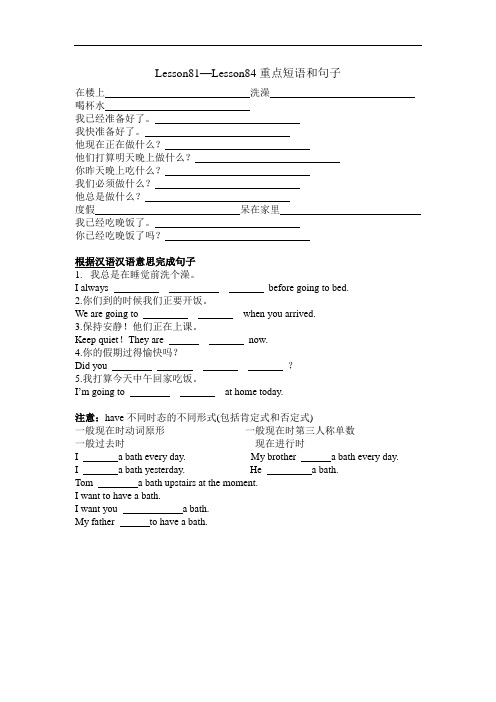
Lesson81—Lesson84重点短语和句子
在楼上洗澡
喝杯水
我已经准备好了。
我快准备好了。
他现在正在做什么?
他们打算明天晚上做什么?
你昨天晚上吃什么?
我们必须做什么?
他总是做什么?
度假呆在家里
我已经吃晚饭了。
你已经吃晚饭了吗?
根据汉语汉语意思完成句子
1.我总是在睡觉前洗个澡。
I always before going to bed.
2.你们到的时候我们正要开饭。
We are going to when you arrived.
3.保持安静!他们正在上课。
Keep quiet!They are now.
4.你的假期过得愉快吗?
Did you ?
5.我打算今天中午回家吃饭。
I’m going to at home today.
注意:have不同时态的不同形式(包括肯定式和否定式)
一般现在时动词原形一般现在时第三人称单数
一般过去时现在进行时
I a bath every day. My brother a bath every day.
I a bath yesterday. He a bath.
Tom a bath upstairs at the moment.
I want to have a bath.
I want you a bath.
My father to have a bath.。
[全]新概念英语第一册全册短语归纳大全
![[全]新概念英语第一册全册短语归纳大全](https://img.taocdn.com/s3/m/a5490ce5bcd126fff6050b88.png)
新概念英语第一册短语归纳大全Lesson 1~ 2Excuse me. 对不起。
I beg your pardon. 请再说一遍。
thank you 感谢你(们)very much 非常地Thank you very much 非常感谢= Many thanks.= Thanks a lot.= Thanks very much.You're welcome. 不必谢。
That's all right. 没关系/ 不客气。
= That's OK.= Not at all.It was nothing. 没什么。
It's a pleasure. 我很乐意。
= My pleasure。
Lesson 3~ 4I'm sorry. 对不起.Lesson 5~ 6Good morning. 早上好.This is + 人名将某人介绍给他人Nice to meet you. 很高兴见到你。
Nice to meet you, too. 我也很高兴见到你。
Glad to meet you. 很高兴见到你。
Pleased to meet you. 很高兴见到你。
How do you do? 你好!what make 什么牌子an new student 一个新学生Lesson 7~ 8what nationality 什么国籍What's your job? 你是做什么工作的?a keyboard operator 电脑操作人员an engineer 一个工程师Lesson 9~ 10 How are you? 你好吗?I'm fine. 我很好。
= I'm very well.How have you been? 你近况如何?How is everything going on? 一切都好吗? Just fine. 还好。
Just so so. 马马虎虎。
新概念英语第一册惯用语整理Lesson81_88
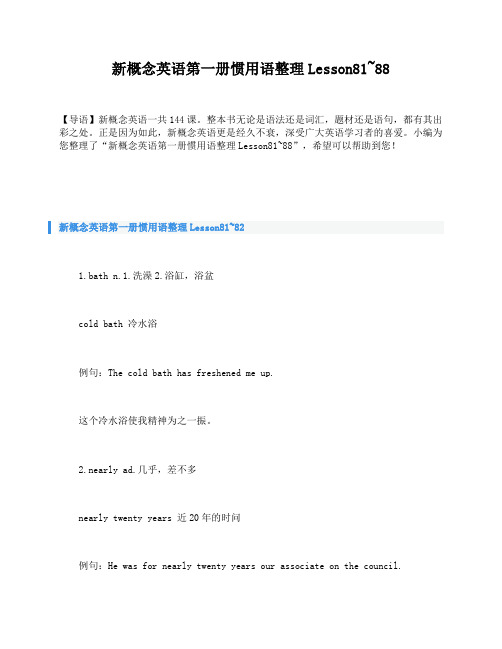
新概念英语第一册惯用语整理Lesson81~88【导语】新概念英语一共144课。
整本书无论是语法还是词汇,题材还是语句,都有其出彩之处。
正是因为如此,新概念英语更是经久不衰,深受广大英语学习者的喜爱。
小编为您整理了“新概念英语第一册惯用语整理Lesson81~88”,希望可以帮助到您!新概念英语第一册惯用语整理Lesson81~821.bath n.1.洗澡2.浴缸,浴盆cold bath 冷水浴例句:The cold bath has freshened me up.这个冷水浴使我精神为之一振。
2.nearly ad.几乎,差不多nearly twenty years 近20年的时问例句:He was for nearly twenty years our associate on the council.他在近20年的时间里一直是我们委员会的同事。
新概念英语第一册惯用语整理Lesson83~841.go for去拿,去找;去请例句:My doctor told me that I'll naed to go for some expensive treatment for my injured knee.我的医生告诉我说我受伤的膝盖得做一些昂贵的治疗。
go for a...去进行某种活动(to go in for a particular activity)例句:1.Let's go for a walk (swim).我们去散步(游泳)吧。
2.I can't find the key to my car. I need to go for a drive.我找不到车钥匙。
我需要开车出去一趟。
2.leave v. 离开;离去;丢弃;抛弃;把…留给;落下,留下,把…交给;产生遗漏:排除;留言 n. 假期;假日leave...up to somebody 将…留给某人来做决定例句:We'll have to leave the decision up to him.我们得让他自己来做这个决定。
新概念英语第一册第81-82短语
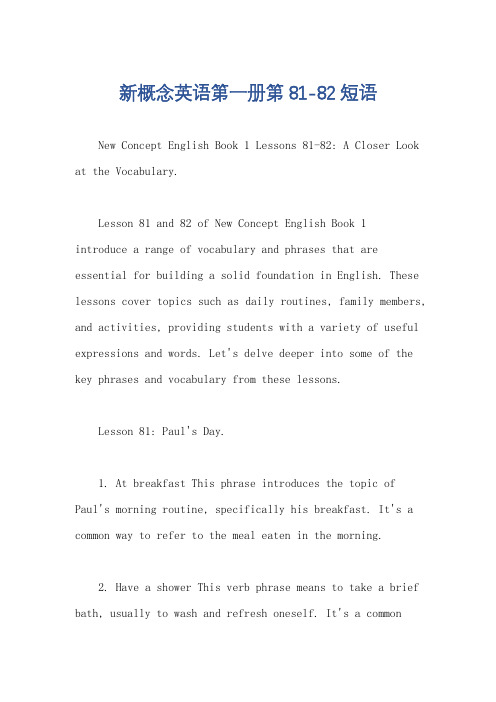
新概念英语第一册第81-82短语New Concept English Book 1 Lessons 81-82: A Closer Look at the Vocabulary.Lesson 81 and 82 of New Concept English Book 1introduce a range of vocabulary and phrases that are essential for building a solid foundation in English. These lessons cover topics such as daily routines, family members, and activities, providing students with a variety of useful expressions and words. Let's delve deeper into some of the key phrases and vocabulary from these lessons.Lesson 81: Paul's Day.1. At breakfast This phrase introduces the topic ofPaul's morning routine, specifically his breakfast. It's a common way to refer to the meal eaten in the morning.2. Have a shower This verb phrase means to take a brief bath, usually to wash and refresh oneself. It's a commonactivity in the morning, especially after waking up.3. At eight o'clock This phrase indicates the specific time, eight o'clock, often used to describe when an event or activity occurs.4. Go to work This verb phrase means to commence one's professional duties or responsibilities. It's a common expression used to describe someone's workday.5. In the office This phrase refers to the place where work is done, specifically in an indoor, enclosed space.6. At lunchtime This phrase indicates the time during the day when lunch is eaten, usually around noon or midday.7. Go home This verb phrase means to return to one's residence or place of living. It's used to describe the end of the workday or any other activity that requiresreturning to one's home.8. In the evening This phrase refers to the time aftersunset and before bedtime, often used to describe evening activities.9. Watch television This verb phrase means to view television programs or content. It's a common evening activity for many people.10. Go to bed This Verb phrase means to retire for the night, usually indicating the end of one's day and the beginning of sleep.Lesson 82: Going to the Doctor.1. Feel ill This phrase means to experience symptoms of sickness or discomfort. It's often used to describe when someone is not feeling well.2. Have a headache This Verb phrase means to experience pain in the head, typically characterized by a dull, throbbing, or constant ache.3. Have a temperature This Verb phrase indicates thepresence of a fever, usually indicated by an elevated body temperature.4. Take one's temperature This Verb phrase refers to the act of measuring someone's body temperature, typically using a thermometer, to determine if they have a fever.5. Go to the doctor This Verb phrase means to visit a medical professional for diagnosis or treatment of an illness or injury.6. See a doctor This Verb phrase is synonymous with "go to the doctor" and means to consult a medical professional for medical advice or treatment.7. Take some medicine This Verb phrase refers to the act of ingesting medication to treat an illness oralleviate symptoms.8. Stay in bed This Verb phrase means to remainreclined in a bed, often as a recommendation for rest or recovery from an illness.9. Feel better This Verb phrase indicates improvementin one's health or condition, usually after being sick or unwell.10. Get up This Verb phrase means to rise from a reclining or lying position, often used to describe waking up in the morning or recovering from illness.The vocabulary and phrases introduced in Lessons 81 and 82 of New Concept English Book 1 provide students with essential language skills for describing daily routines, health conditions, and common activities. These lessons are fundamental in building a strong foundation for further learning in English.。
新概念英语第一册惯用语整理Lesson89_94
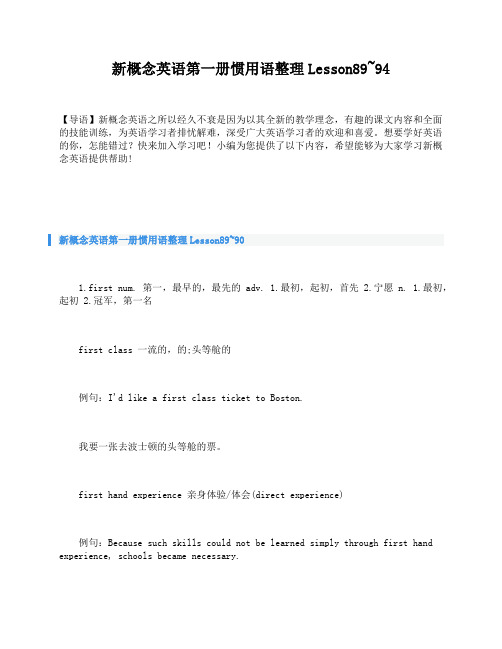
新概念英语第一册惯用语整理Lesson89~94【导语】新概念英语之所以经久不衰是因为以其全新的教学理念,有趣的课文内容和全面的技能训练,为英语学习者排忧解难,深受广大英语学习者的欢迎和喜爱。
想要学好英语的你,怎能错过?快来加入学习吧!小编为您提供了以下内容,希望能够为大家学习新概念英语提供帮助!新概念英语第一册惯用语整理Lesson89~901.first num. 第一,最早的,最先的 adv. 1.最初,起初,首先2.宁愿 n. 1.最初,起初 2.冠军,第一名first class 一流的,的;头等舱的例句:I'd like a first class ticket to Boston.我要一张去波士顿的头等舱的票。
first hand experience 亲身体验/体会(direct experience)例句:Because such skills could not be learned simply through first hand experience, schools became necessary.由于这些技巧不能仅仅通过亲自体验来学习,学校的产生成为了必然。
first thing first 先说要紧的(a more important subject must be discussed or agreed first)例句:Maybe we can go to concert. But we have to get the first thing first. Have you finished your home assignment)也许我们可以去听音乐会,但还是先说要紧的吧。
你完成家庭作业了没有?2.how adv.怎样;怎么;为什么;怎么样;多少;作为称呼的一部分;非正式,(你认为)怎么样;为什么how time drags! 时间过得真慢!how are you doing with... ...干得怎么样了,进展如何(how are things goingas far as... is concerned)A:Jack, how are you doing with your paper?A:杰克,你的论文写得怎么样了?B:I've written and rewritten it so many times that I wonder when I can finish it.B:我已经写完又重新写了这么多次,真不知道什么时候才能完成。
(完整版)新概念一81--90短语总结
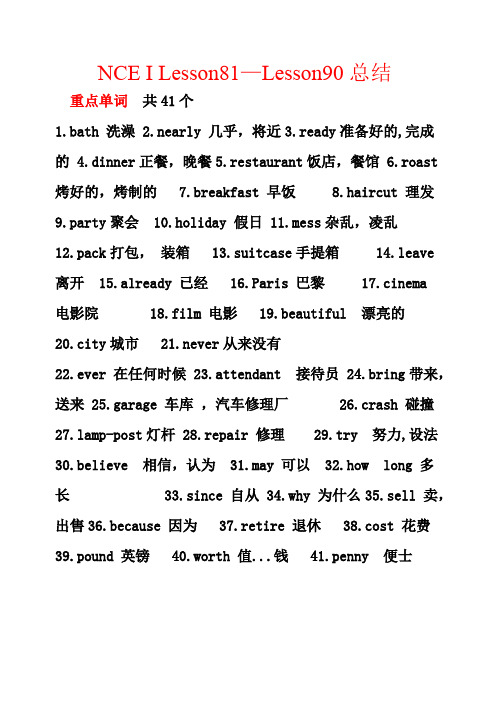
NCE I Lesson81—Lesson90总结重点单词共41个1.bath 洗澡2.nearly 几乎,将近3.ready准备好的,完成的 4.dinner正餐,晚餐5.restaurant饭店,餐馆 6.roast 烤好的,烤制的 7.breakfast 早饭 8.haircut 理发9.party聚会 10.holiday 假日 11.mess杂乱,凌乱12.pack打包,装箱 13.suitcase手提箱 14.leave 离开 15.already 已经 16.Paris 巴黎 17.cinema电影院 18.film 电影 19.beautiful 漂亮的20.city城市 21.never从来没有22.ever 在任何时候 23.attendant 接待员 24.bring带来,送来 25.garage 车库,汽车修理厂 26.crash 碰撞mp-post灯杆 28.repair 修理 29.try 努力,设法30.believe 相信,认为 31.may 可以 32.how long 多长 33.since 自从 34.why 为什么35.sell 卖,出售36.because 因为 37.retire 退休 38.cost 花费39.pound 英镑 40.worth 值...钱 41.penny 便士重点短语1.roast beef 烤牛肉2.roase potatoes 烤土豆3.roast sweet potatoes 烤地瓜4.have a bath 洗澡5.be upstairs 在楼上6.be downstairs 在楼下7.be ready for... 为...做好准备8.have a cigarette 抽根烟9.havea glass of whisky 喝一杯威士忌 10.have dinner 吃晚餐11.have lunch together一起吃午餐 12.go to a restaurant 去饭店吃饭13.have breakfast 吃早餐 14.have tea 喝茶 15.havea meal 吃饭 16.have a swim 游泳 17.have a haircut 理发18.have a lesson 上课 19.have a party 聚会 20.have a holiday 度假 21.have a good time 玩的高兴 22.at the restaurant 在饭店 23.go on holiday (have a holiday)度假e in 进来 25. with us 和我们一起 26.have a cup of coffee 喝杯咖啡27.have lunch 吃午饭 28.after lunch 午饭后29.want to do sth 想要做某事30.excuse the mess 请原谅这里乱七八糟的 31.go into 进入 32.pack suitcases 装箱子 33.stay at home 待在家里 34.leave for sw 离开到某地方去 35.leave sw.(sb) 离开某地,某人 36.this year今年 37.have (has) 加v.(过分) 现在完成时基本句型 38.have fruits 吃水果 39.have vegetables 吃蔬菜40.have meat吃肉 41.have beer 喝啤酒 42.have ,has been to 去过...,已回来 43.have gone to ...去了...未归 44.be on 上演45.on television 在电视上播放 46.on the radio 广播中47.an old film 一部老电影 48.be there 在那 49.all the time 始终,一直50.go to the cinema 去看电影 51.at the cinema 在电影院 52.a large city 大都市 53.a beautiful city 一座漂亮的城市 st year 去年 55.in April在四月56.be just like ... 就像.... 57.air the room 给房间通风58.clean the shoes 擦鞋 59.open the window 开窗户60. sharpen the pencil 削铅笔 61.turn on the TV 打开电视 62.listen to the stereo 听音响 63.boil the milk 煮牛奶 64.anser the telephone 接电话 65.empty the basket 倒空篮子 66.ask the question 问问题 67.type a letter 打信 68.wash one's hands 洗手 69.walk across the street 过马路70.paint the shelf 给架子涂色 71.dust the cupboard 给橱柜掸灰 72.have a car crash 出车祸73.the number of your car 你的车牌号 74.bring sth to sb 把某物带给某人 75.three days ago 三天前76.remember to do...记住要做.77.remember doing.记得做过谋事78.work on..从事...79.go into the building 进入大楼80.have a look 看一看81.drive into...撞倒 . 82.try to do.尽力做..83.try doing... 尝试做 84.try one's best尽最大的努力 85.to tell you the truth 告诉你实话吧86.for sale 待售 87.of course 当然 88.have a look at.看看e in 进来90.how long 多久91.live here 住在这 92.twenty years ago 二十年前 93.a long time 很长一段时间 94.since 1976 自从1976年 95.buy a small house买一所小房子96.in the country 在乡下97.how much 多少钱 98.a lot of money 很多钱 99.be worth...(doing...) 值...钱(值得做) 100.have the last word 最后拍板 101.seeit first首先看看它 102.believe sb 相信某人的话103.believe in sb 相信某人共103个NCE I Lesson81—Lesson90总结1.感官动词:feel smell seem taste sound look 后加形容词eg :The food smells good ./ He looks ill.2.remember to do sth 记得去做某事。
新概念英语第一册单词lesson81-100
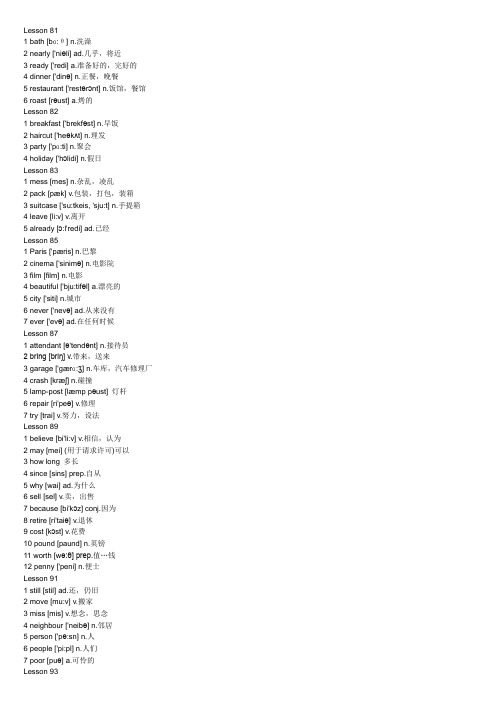
Lesson 811 bath [bɑ:θ] n.洗澡2 nearly ['niəli] ad.几乎,将近3 ready ['redi] a.准备好的,完好的4 dinner ['dinə] n.正餐,晚餐5 restaurant ['restərɔnt] n.饭馆,餐馆6 roast [rəust] a.烤的Lesson 821 breakfast ['brekfəst] n.早饭2 haircut ['heəkʌt] n.理发3 party ['pɑ:ti] n.聚会4 holiday ['hɔlidi] n.假日Lesson 831 mess [mes] n.杂乱,凌乱2 pack [pæk] v.包装,打包,装箱3 suitcase ['su:tkeis, 'sju:t] n.手提箱4 leave [li:v] v.离开5 already [ɔ:l'redi] ad.已经Lesson 851 Paris ['pæris] n.巴黎2 cinema ['sinimə] n.电影院3 film [film] n.电影4 beautiful ['bju:tifəl] a.漂亮的5 city ['siti] n.城市6 never ['nevə] ad.从来没有7 ever ['evə] ad.在任何时候Lesson 871 attendant [ə'tendənt] n.接待员2 bring [briŋ] v.带来,送来3 garage ['gærɑ:ʒ] n.车库,汽车修理厂4 crash [kræʃ] n.碰撞5 lamp-post [læmp pəust] 灯杆6 repair [ri'peə] v.修理7 try [trai] v.努力,设法Lesson 891 believe [bi'li:v] v.相信,认为2 may [mei] (用于请求许可)可以3 how long 多长4 since [sins] prep.自从5 why [wai] ad.为什么6 sell [sel] v.卖,出售7 because [bi'kɔz] conj.因为8 retire [ri'taiə] v.退休9 cost [kɔst] v.花费10 pound [paund] n.英镑11 worth [wə:θ] prep.值…钱12 penny ['peni] n.便士Lesson 911 still [stil] ad.还,仍旧2 move [mu:v] v.搬家3 miss [mis] v.想念,思念4 neighbour ['neibə] n.邻居5 person ['pə:sn] n.人6 people ['pi:pl] n.人们7 poor [puə] a.可怜的Lesson 931 pilot ['pailət] n.飞行员2 return [ri'tə:n] v.返回3 New York ['nju: 'jɔ:k] n.纽约4 Tokyo ['təukjəu] n.东京5 Madrid [mə'drid] n.马德里6 fly [flai] v.飞行Lesson 941 Athens ['æθinz] n.雅典2 Berlin [bə:'lin] n.柏林3 Bombay [bɔm'bei] n.孟买4 Geneva [dʒi'ni:və] n.日内瓦5 Moscow ['mɔskəu] n.莫斯科6 R om e [rəum] n.罗马7 Seoul [səul] n.汉城8 Stockholm ['stɔkhoum] n.斯德哥尔摩9 Sydney ['sidni] n.悉尼Lesson 951 return [ri'tə:n] n.往返2 train [trein] n.火车3 platform ['plætfɔ:m] n.站台4 plenty ['plenti] n.大量5 bar [bɑ:] n.酒吧6 station ['steiʃən] n.车站,火车站7 catch [kætʃ] v.赶上8 miss [mis] v.错过Lesson 971 leave [li:v] v.遗留2 describe [di'skraib] v.描述3 zip [zip] n.拉链4 label ['leibəl] n.标签5 handle ['hændl] n.提手,把手6 address [ə'dres] n.地址7 pence [pens] n.penny的复数形式8 belong [bi'lɔŋ] v.属于Lesson 991 ow [au] int.哎哟2 slip [slip] v.滑倒,滑了一脚3 fall [fɔ:l] v.落下,跌倒4 downstairs [ˌdaun'steəz] ad.下楼5 hurt [hə:t] v.伤,伤害,疼痛6 back [bæk] n.背7 stand up 起立,站起来8 help [help] v.帮助9 at once [ət 'wʌns] 立即10 sure [ʃuə] a.一定的,确信的11 X-ray ['eksrei] n.X光透视。
新概念英语第一册笔记81-90
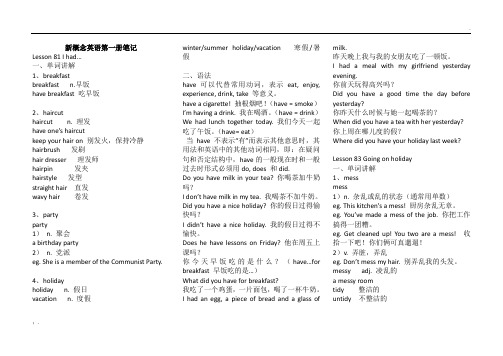
新概念英语第一册笔记Lesson 81 I had…一、单词讲解1、breakfastbreakfast n.早饭have breakfast 吃早饭2、haircuthaircut n. 理发have one’s haircutkeep your hair on 别发火,保持冷静hairbrush 发刷hair dresser 理发师hairpin 发夹hairstyle 发型straight hair 直发wavy hair 卷发3、partyparty1)n. 聚会a birthday party2)n. 党派eg. She is a member of the Communist Party.4、holidayholiday n. 假日vacation n. 度假winter/summer holiday/vacation 寒假/暑假二、语法have可以代替常用动词,表示eat, enjoy,experience, drink, take 等意义。
have a cigarette! 抽根烟吧!(have = smoke)I’m having a drink. 我在喝酒。
(have = drink)We had lunch together today. 我们今天一起吃了午饭。
(have= eat)当have不表示“有”而表示其他意思时,其用法和英语中的其他动词相同,即:在疑问句和否定结构中,have的一般现在时和一般过去时形式必须用do, does 和did.Do you have milk in your tea? 你喝茶加牛奶吗?I don’t have milk in my tea. 我喝茶不加牛奶。
Did you have a nice holiday? 你的假日过得愉快吗?I didn’t have a nice holiday. 我的假日过得不愉快。
Does he have lessons on Friday? 他在周五上课吗?你今天早饭吃的是什么?(have…forbreakfast 早饭吃的是…)What did you have for breakfast?我吃了一个鸡蛋,一片面包,喝了一杯牛奶。
- 1、下载文档前请自行甄别文档内容的完整性,平台不提供额外的编辑、内容补充、找答案等附加服务。
- 2、"仅部分预览"的文档,不可在线预览部分如存在完整性等问题,可反馈申请退款(可完整预览的文档不适用该条件!)。
- 3、如文档侵犯您的权益,请联系客服反馈,我们会尽快为您处理(人工客服工作时间:9:00-18:30)。
Lesson81
一、翻译短语
1.洗个澡
2.抽根烟
3.喝杯威士忌
4.吃晚饭
5.一起吃午饭
6.去一家餐厅
二、翻译句子
1.山姆来了。
2.他在楼上。
3.我马上就好。
4.-你们吃什么?
--我们吃的是烤牛肉和土豆。
Lesson82
一、翻译短语
1.吃早饭
2.吃午饭
3.喝茶
4.吃晚饭
5.吃一顿饭
6.游个泳
7.理发__________________________
8.上课
9.聚会________________________ 10.玩的开心
11.度假________________________
二、翻译句子
1.上个月我们去度假了。
2.他打算做什么?
Lesson83
一、写出动词的过去式和过去分词
leave ___________ ___________ have ___________ ___________
二、翻译短语
1.喝杯咖啡
2.走进客厅
3.打包我们的行李
4.呆在家
5.跟我们一起吃午饭
6.度假
三、翻译句子
1.乱七八糟,请原谅。
2.我已经吃过午饭了。
3.我刚喝了一杯
4.房间里乱七八糟。
5.我们明天打算离开。
_________________________________________________
6.今年我已度过假了。
_________________________________________________
Lesson84
一、翻译句子
1.我已经喝了一些咖啡。
2.他们刚吃了一些桃子。
3.他已喝了一些咖啡吗?
4.她刚吃了些水果。
5.他们还没有吃肉了。
Lesson85
am/is ___________ ___________ are ___________ ___________ do ___________ ___________ see ___________ ___________
二、翻译短语
1.巴黎之春
2.在电视上
3.一部老片儿
4.一直
5.就像
6.一座美丽的城市
三、翻译句子
1.--你刚去过电影院吗?
--是的,我刚去过。
___________________________________________________
2.上映什么片子?
3.我已经看过了。
4.我从未去过那。
5.你曾去过那儿吗?___________________________________________________
Lesson86
一、翻译句子
1.她刚煮了一个鸡蛋。
2.他从来没去过中国。
3.他已经去了伦敦。
4.我今天早晨倒空了篮子。
5.她五分钟前打的这封信。
______________________________________________
Lesson87
bring ___________ ___________ drive ___________ ___________
二、翻译短语
1.从事、干.....
2.去车库
3.出车祸
4.看看......
5.撞到
6.设法、努力做某事
三、翻译句子
1.你车牌号是多少?
2.你什么时候把它带来给我们的?
3.你们的机械师已经完成了吗?
4.我把汽车撞在路灯柱上了。
____________________________________________
5.他们正设法在修。
__________________________________________________
Lesson88
一、写出动词的过去式和过去分词
buy ___________ ___________ find ___________ ___________ get ___________ ___________ have ___________ ___________ hear ___________ ___________ leave ___________ ___________ lose ___________ ___________ make ___________ ___________ meet ___________ ___________ send ___________ ___________ sweep ___________ ___________ tell ___________ ___________
二、翻译短语
1.在收音机上听新闻
2.扫地
3.告诉他事实
4.整理床铺
三、翻译句子
1. --老板已经离开了吗?
--是的,离开了。
--他什么时候离开的?
--他十分钟前离开的。
2.她已经找到了她的钢笔吗?
Lesson89
一、写出动词的过去式和过去分词
sell ___________ ___________ cost ___________ ___________
二、翻译短语
1.很长一段时间
2.许多钱
3.多长时间
4.最后拍板
三、翻译句子
1.我想这房子是要出售的吧。
2.我能看一看它吗?
3.你在这住多久了?
4.我在这住了20年了。
5这座房子卖多少钱?_________________________________________________ 6.它确实是值这么多钱_________________________________________________
Lesson90
一、写出动词的过去式和过去分词
cut ___________ ___________ put ___________ ___________ read ___________ ___________ set ___________ ___________ shut ___________ ___________ come ___________ ___________ give ___________ ___________ swim ___________ ___________ take ___________ ___________ eat ___________ ___________ go ___________ ___________ rise ___________ ___________ see ___________ ___________ speak ___________ ___________
二、翻译句子
1. --她已经和他讲话了吗?
--是的,讲了。
--她什么时候和他讲话的?
--她昨天和他讲话的。
2.她还没有读过这本书。
